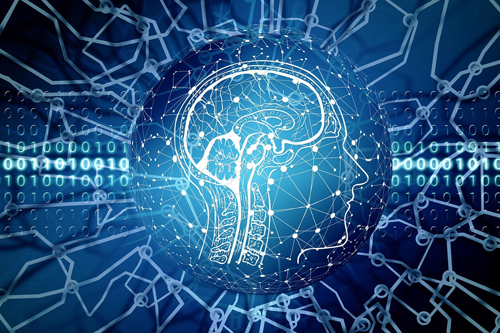
Argonne National Laboratory researchers, including seven Advanced Photon Source (APS) scientists, are recipients of U.S. Department of Energy (DOE) funding awards for research and development in artificial intelligence (AI) and machine learning (ML) methods to handle data and operations at DOE scientific user facilities. The APS researchers, together with colleagues at the Argonne Center for Nanoscale Materials (CNM), Data Science and Learning Division (DSL), High Energy Physics Division (HEP), and Physics Division will bring to Argonne $6.8 million of the total $37 million in DOE funding.
Argonne physicists and computational scientists have been leaders in developing approaches to apply AI/ML to accelerator operations and experimental data collection and analysis at the APS, CNM, and ATLAS. They will be sharing their expertise as leaders and collaborators in seven AI/ML projects. These cross-facility teams will focus on new developments common to the scientific user facilities operated for the Scientific User Facilities Division in the Office of Science Basic Energy Sciences Program, and the Nuclear Physics Program.
“Artificial Intelligence and machine learning have the potential to transform a host of scientific disciplines and to revolutionize experimentation and operations at user facilities in the coming years,” said Dr. Chris Fall, Director of DOE’s Office of Science. “These awards will help ensure America remains on the cutting edge of these critical technologies for science.”
Seven DOE national laboratories will lead a total of 14 projects aimed at both automating facility operations and managing data modeling, acquisition, mining, and analysis for the interpretation of experimental results. The projects involve large x-ray light sources, neutron scattering sources, particle accelerators, and nanoscale science research centers.
The projects are supported by three program offices within DOE’s Office of Science: Basic Energy Sciences, High Energy Physics, and Nuclear Physics.
Awards were selected by competitive peer review under a DOE National Laboratory Announcement. Planned funding totals $37 million over three years, with $11 million in Fiscal Year 2020 dollars and out-year funding contingent on congressional appropriations.
Nicholas Schwarz, Group Leader of the Scientific Software Engineering & Data Management Group in the APS X-ray Science Division is a participant in several of the award groups. “These awards showcase how Argonne researchers are a central part of DOE-wide efforts in AI/ML. These awards will push the boundaries of exciting user science at the APS, CNM, and ATLAS,” Schwarz said.
“For the APS and CNM, these awards by our funding agency at the Basic Energy Sciences program in the Office of Science are a well-deserved recognition of the dedication and outstanding work being carried forward by these Argonne scientists and their colleagues,” said Stephen Streiffer, Argonne Deputy Laboratory Director for Science & Technology and Interim Associate Laboratory Director for the Photon Sciences Directorate. “In the future, the benefits from the research by all of these dedicated scientists will reach far beyond Argonne.”
Here is a list of Argonne staff and colleagues from other DOE labs on each award:
“A Collaborative Machine Learning Platform for Scientific Discovery” Principal Investigator (PI) - Alex Hexemer (Advanced Light Source, Lawrence Berkeley National Laboratory [LBNL]), Subramanian Sankaranarayanan (CNM-Argonne), Nicholas Schwarz (APS-Argonne)
“A Digital Twin for In Silico time-resolved Experiments” PI - Subramanian Sankaranarayanan (CNM-Argonne), Maria Chan (CNM-Argonne), Mathew Cherukara (APS-Argonne), Pierre Darancet (CNM-Argonne), Ross Harder (APS-Argonne), Haidan Wen (APS-Argonne), Jianguo Wen (CNM-Argonne)
“Actionable Information from Sensor to Data Center” PI - Jana Thayer (Linac Coherent Light Source, SLAC National Accelerator Laboratory), Ian Foster, Zhengchun Liu (DSL-Argonne), Peter Kenesei, Antonino Miceli, Nicholas Schwarz (APS-Argonne)
“Machine Learning for Autonomous Control of Accelerators” PI - Daniel Ratner (SLAC National Accelerator Laboratory), Michael Borland (APS-Argonne)
“Integrated Platform for Multimodal Data Capture, Exploration and Discovery Driven by AI Tools” PI - Eli Stavitski (National Synchrotron Light Source-II, Brookhaven National Laboratory) Chengjun Sun, Steve Heald, Nicholas Schwarz (APS-Argonne) Maria Chan (CNM-Argonne)
“4DCamera Distillery: From Massive Electron Microscopy Scattering Data to Useful Information with AI/ML” PI - Andrew Minor (Molecular Foundry, LBNL) Maria Chan (CNM-Argonne)
“Use of AI to Optimize Accelerator Operations and Improve Machine Performance” PI – Brahim Mustapha; B. Blomberg, C. Dickerson, J. Martinez C. Peters (Physics-Argonne) W. Liu, J. Power, (HEP-Argonne)
